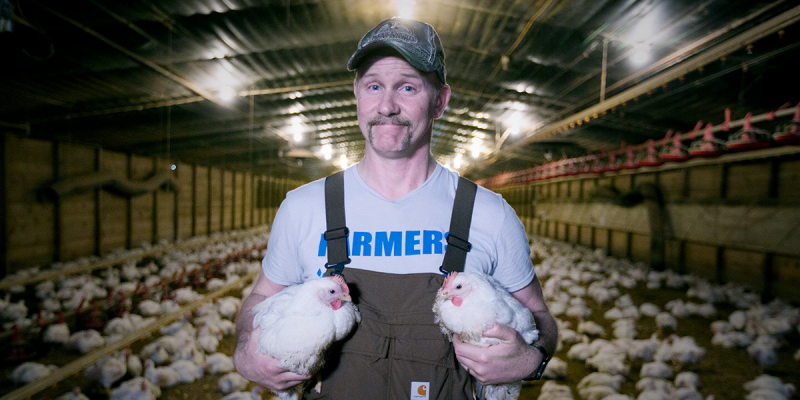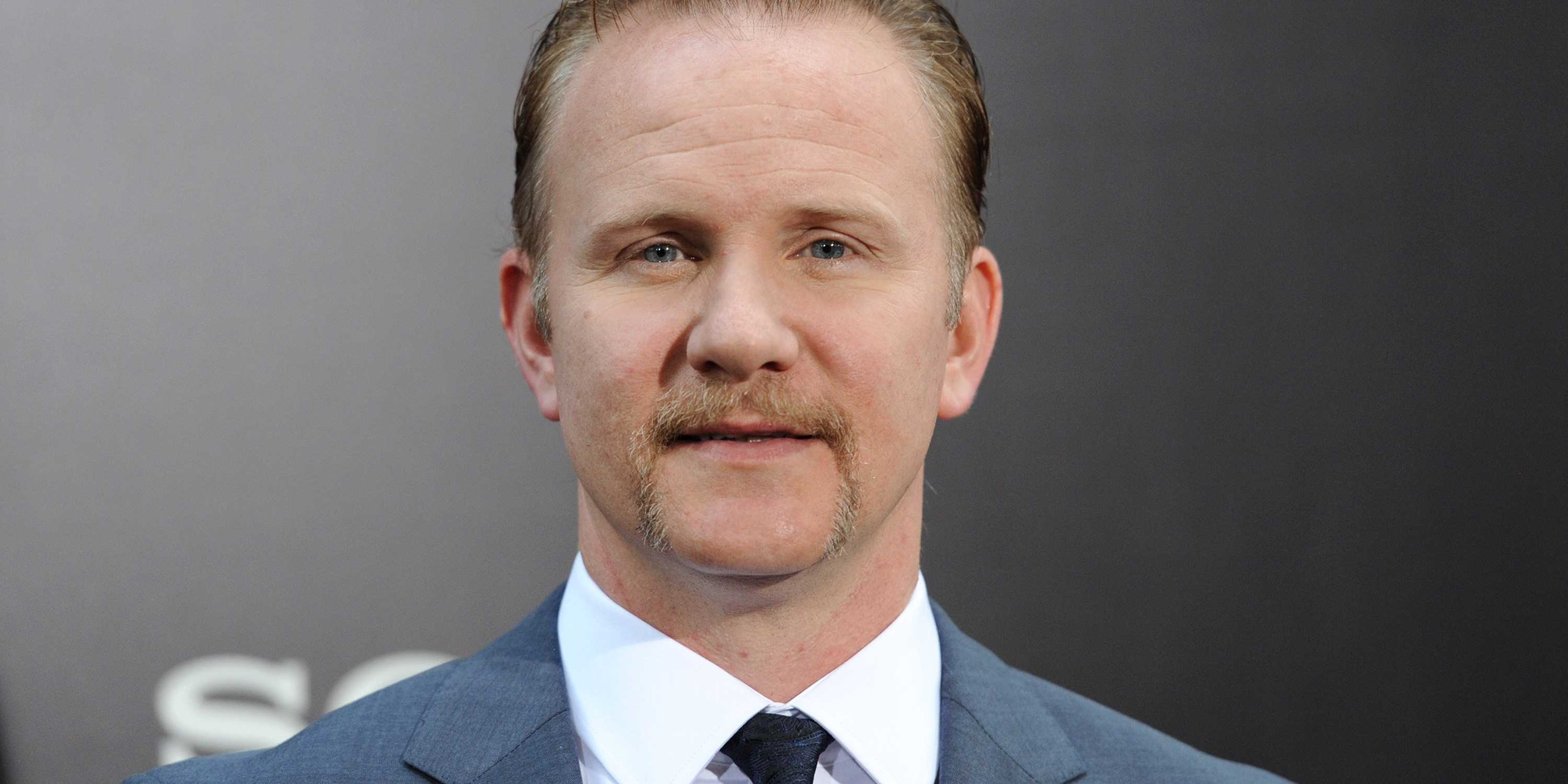- Morgan Spurlock spoke candidly to Business Insider about his life the last year and a half after his #MeToo confession on Twitter.
- Spurlock said that since then he has gotten sober following alcohol abuse, his production company Warrior Poets has closed down, and his future projects were scrapped.
- Spurlock explained how he finally got his latest movie, “Super Size Me 2: Holy Chicken!,” in theaters after YouTube dropped the release of the movie following his tweet.
- The director said the purpose of his tweet was to admit wrongdoing and “move forward.”
- Visit Business Insider’s homepage for more stories.
A year and a half ago, documentary filmmaker Morgan Spurlock left the public eye after posting a confession of sexual misconduct on Twitter at the height of the #MeToo movement.
Now Spurlock is on West 23rd Street in New York City, passing out flyers for a chicken sandwich restaurant. Spurlock is in full salesman mode for the pop-up restaurant he’s opened, called Holy Chicken. The pop-up is meant to promote the theatrical release of his latest movie, “Super Size Me 2: Holy Chicken!,” which looks at the dark side of the popular chicken sandwich business.
Many people walk right by him, though some recognize him and stop to take a selfie. This is the first step in what Spurlock hopes is the second act of his career.
Spurlock experienced overnight success 15 years ago thanks to his debut feature, “Super Size Me,” and went on to become a heavyweight in the non-fiction world. With over 20 directing credits to his name, Spurlock also had a show on CNN and a slew of projects on the horizon, including a docuseries with LeBron James through Spurlock’s Warrior Poets production company.
That all disappeared on December 13, 2017, when Spurlock tweeted the words "I am Part of the Problem." That tweet linked to a letter in which Spurlock confessed to multiple acts of sexual misconduct in his past. According to Spurlock's letter, a woman had accused him of rape in college, he'd settled a workplace sexual harassment claim, and he'd been unfaithful to past wives and girlfriends.
Spurlock's #MeToo moment was a rare instance of someone admitting guilt despite having no public accusations made against him. Within days of the tweet, YouTube bailed on the distribution deal to release "Super Size Me 2," and Warrior Poets was no more, as were the other projects in the pipeline. Some critics saw his confession as a carefully crafted way to get ahead of a #MeToo story on him - "image rehabilitation disguised as a wrecking ball."
Business Insider spoke with Spurlock about what led to his #MeToo tweet, his surprise at the ramifications that followed, his stint in rehab for alcohol abuse, and his uncertain future.
This interview has been edited for length and clarity.
Jason Guerrasio: It's kind of crazy that your movie world premiered two years ago but it is still relevant today, maybe even more so than then.
Morgan Spurlock: It's fortunate because that's rarely the case. Sadly, the reason we're so fortunate is because the business is so f---ed up. The movie is still relevant because consumers are still getting lied to. They are still getting manipulated by corporations. Farmers are still getting forced into lives of indentured servitude by giant chicken corporations. None of that has changed in two years.
Guerrasio: But things have certainly changed for you in those two years. When we spoke back in 2017, you were on the verge of signing a deal with YouTube to release "Super Size Me 2," and you had plans for a Holy Chicken food truck following the movie around the country. How did it get from that point to you writing that tweet three months later?
Spurlock: Things were blowing up, the movie was about to go to Sundance, one of the few films that ever does the Toronto-to-Sundance rollout. Then we were going to show it at Berlin and South by Southwest and then open it theatrically. Then everything imploded - YouTube Red stepping away from the deal, which was best because we probably would have just gotten thrown away in regards of a release. So it was better for the film to sit on a shelf.
Guerrasio: Was it tough to get the rights to the movie back?
Spurlock: No. The deal was signed and YouTube basically walked away, so I got it back and it was on a shelf for 18 months. Then within eight days of when I wrote what I wrote, I went from 65 employees to three, basically me and my brother and our accountant. Every movie and TV project we had went away. The hardest part for me was I literally put so many people in my company out of work right before the holidays. It was right before Christmas. It was really hard for me to personally understand and deal with the situation. But I also knew I myself had put those people into this difficult spot.

Guerrasio: It was clear with what you wrote that you had to get something off your chest, but was it because you felt any day you could be the next #MeToo story?
Spurlock: There was never a sense that someone was coming after me. It was misconstrued when I wrote, "when will they come for me?" I basically meant the number of people I had spoken to started to take stock of their past. A number of men, and even women, started asking, "Have I done something?" "Has someone been offended by what I've done?" I felt I have said things and had behavioral missteps that are just as upsetting and problematic and looking back I'm upset about them. I felt I should just admit this, I should own up to it. I should say that I can do better. So in this heated #MeToo conversation, me doing that was partly that we need to have a space where people can own up to their past and confidently move forward. And I don't think we were there then and I still don't think we are there now.
Guerrasio: But did you understand the ramifications that would come from it?
Spurlock: I thought some people would get upset. I thought some things may go away. I never thought it would be complete slash and burn of everything. Within eight days, our whole company was decimated. I tried to keep it going. I went to rehab.
Guerrasio: How long have you been sober?
Spurlock: [Checks app on his phone] Today is day 641. But I can't blame anyone for walking away when they did. I got back from rehab and went to the office for the first time and the place was like a tomb. Within a week, people just picked up their stuff and left. Computers were still on. Everything was still running. Shows we were working on were still up on [the editing system] Avid. People just walked away.
Guerrasio: The stories that came out reporting that Warrior Poets had a frat-boy atmosphere, do you think that was a valid criticism?
Spurlock: I think that we had men at the top of the company and we should have had a stronger female voice leading the company. Listen, I'm guilty of it. I said things that were inappropriate at the time that I didn't think about. So, as the person who runs the company, I set the tone and there were times I didn't nip things in the bud when I should have. And at the same time, it was a place where people liked to have fun. In the last year and a half, I've been meeting with people who have worked at the company and people loved working there. However, there were people I spoke to who didn't have as many good times. I think it's recognizing that balance and understanding how things are going to be different moving forward.
Guerrasio: And in regards to "Super Size Me 2," looking back, do you think you should have communicated better with the farmers about why the movie got shelved?
Spurlock: Well, what was I going to tell them? I actually called [farmer featured in the movie] John Buttram on my way to rehab. [Another farmer in the movie] Charles [Morris] may have felt neglected but I had nothing to really tell these guys because the movie wasn't going anywhere. It was sitting on the shelf. Could I have been more communicative, 100%. But for that year where I was trying to figure out what was going to happen with Warrior Poets, I was also trying to figure out what was going on with the film. I spoke with I don't even know how many distributors, and they were just afraid to put the movie out.
Guerrasio: Because you're front and center in it.
Spurlock: Right.
Guerrasio: Did any ever ask if it was possible to cut you out of the movie?
Spurlock: It's impossible. You're following me for the whole movie. It would be voiceover and cutaways the entire film. So that wasn't an option. I just realized it was going to take time. So I talked to Peter Goldwyn, [president] at Samuel Goldwyn Films, because we were talking about reupping the rights for the first "Super Size Me" film. They have been doing distribution for that film for the last 15 years. He said, "The option's up, do you want to reup?" And I said, "I'd love to, and what do you think about taking on the sequel?" They had loved it at the time and weren't in the running to get it because the number had gotten too high. I mean the deal with YouTube Red put us in the black right off the sale, and them some [the YouTube deal was reportedly for $3.5 million]. So we were fortunate that Samuel Goldwyn would do it. I feel incredibly grateful.
I mean, it's hard not to support those farmers. That's the thing that hurt me really the most. I was on my way to rehab, I'm in the car on the way to the plane, and I call my parents and I called Jonathan Buttram and his wife Connie and I'm crying and they're crying. We all know the film isn't going anywhere now. And they said, "We just hope you're okay." Their biggest concern was me at that moment and I was like these people are the greatest human beings around. I felt I had to do everything I could to do right by them and that's what the last year and a half has been about. All the chicken farmers who said things to me they wouldn't say to anyone else. For them to finally get their day in the court of public opinion is the most important thing.
Guerrasio: Charles believed in this movie so much he was going to mortgage his house.
Spurlock: I know!
Guerrasio: Do you want to tell different stories than you have in the past?
Spurlock: I'm definitely a different person than I was a year and a half ago. My priorities are different. With the company, it was like a machine: 65 people, we're paying $55,000 a month in rent. There was so much we had to do to keep that train on the tracks all the time. So to be in a place where I'm literally back almost to where I was 15 years ago, now I can do anything. But what is that?
